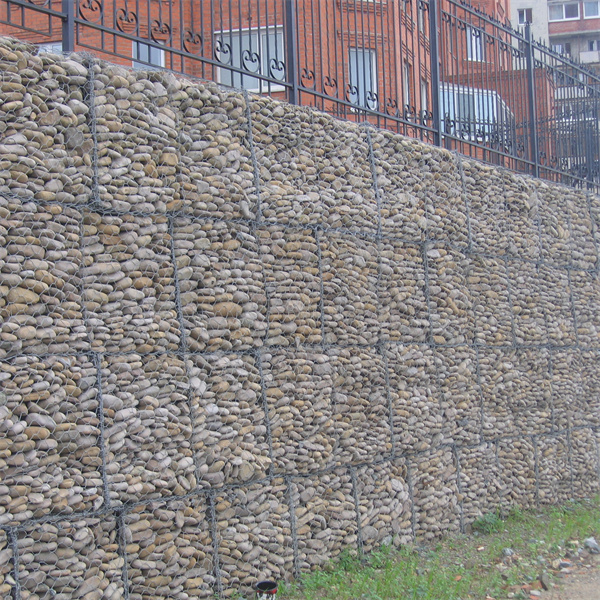joulu . 16, 2024 13:01 Back to list
gabion wall wire factory
Understanding Gabion Wall Wire Factory An Overview
Gabion walls, constructed from wire mesh filled with rock, concrete, or other materials, have gained popularity as a durable and eco-friendly solution for various engineering and landscape applications. As the demand for these versatile structures grows, so does the importance of gabion wall wire factories that produce the high-quality wire products essential for their construction.
What Are Gabion Walls?
Gabion walls are primarily used for erosion control, soil stabilization, and aesthetic landscaping. They are constructed by stacking wire mesh cages, or gabions, filled with stones, gravel, or other materials. The design allows water to flow through the spaces between the rocks, making them effective for managing drainage and preventing soil erosion. Furthermore, they can be used in diverse applications, from constructing retaining walls in residential areas to reinforcing riverbanks and building noise barriers along highways.
The Role of Gabion Wall Wire Factories
Gabion wall wire factories play a crucial role in the production of the wire mesh that forms the backbone of these structures. The quality of the wire is paramount, as it must withstand environmental stresses such as moisture, temperature variations, and the weight of the materials within the gabions. Therefore, a reputable factory ensures that the wire is made from high-quality materials, typically galvanized or stainless steel, to enhance its durability and resistance to corrosion.
Manufacturing Process
The manufacturing process of gabion wall wire involves several key steps. First, the wire is drawn to the desired thickness. This involves pulling the steel through dies to achieve the specified gauge. For gabion applications, the wire is often thicker than standard wire to provide increased strength and stability.
gabion wall wire factory

After the wire is drawn, the next step is coating. Galvanization is a popular method where the wire is coated with zinc to prevent rust and corrosion. The thickness of the zinc coating can vary, and a thicker coating typically offers better protection, especially in harsh environments.
Once the wire is coated, it is woven or welded into the desired mesh shape. The size of the openings in the mesh can vary according to specific project requirements. Factories can produce a range of mesh sizes to cater to the diverse needs of customers, from simple landscaping projects to complex civil engineering applications.
Quality Control
Quality control is a vital component of production in gabion wall wire factories. The wire mesh must meet specific standards to ensure it performs well under various conditions. Quality assurance processes might include tensile testing, corrosion resistance testing, and dimensional inspections. By adhering to industry standards and regulations, manufacturers can ensure their products are both safe and effective.
Sustainable Practices
As sustainability becomes more critical in construction and landscaping, many gabion wall wire factories are adopting eco-friendly practices. Using recycled materials for wire production, minimizing waste during manufacturing, and utilizing energy-efficient processes are some ways these factories are contributing to environmental conservation. Gabion walls also promote sustainability by allowing for the natural integration of structures with their surroundings, enhancing biodiversity and improving soil health.
Conclusion
Gabion wall wire factories are essential players in the growing market for sustainable and durable construction solutions. By providing high-quality wire mesh that meets the demands of diverse applications, these factories support the construction of gabion structures that serve practical purposes while enhancing the aesthetic appeal of environments. As urbanization continues and the need for eco-friendly solutions escalates, the role of gabion wall wire manufacturers will only become more significant in our efforts to create resilient and sustainable infrastructure. Whether for erosion control, landscaping, or architectural purposes, gabion walls represent a blend of functionality and design, with the wire mesh at their core playing an indispensable role in their success.
-
HESCO Gabion Baskets for Coastal Erosion Prevention
NewsAug.22,2025
-
Longevity and Durability of River Rock Gabion Walls
NewsAug.22,2025
-
How to Integrate Gabion 3D Walls in Urban Planning
NewsAug.22,2025
-
Reno Mattress Gabion Applications in Civil Engineering
NewsAug.22,2025
-
How to Install Wire Mesh for Gabion Baskets Properly
NewsAug.22,2025
-
Best Materials for Filling a Chain Link Gabion
NewsAug.22,2025
-
Wire Mesh Thickness Impact on Gabion Wall Load Bearing
NewsAug.12,2025






